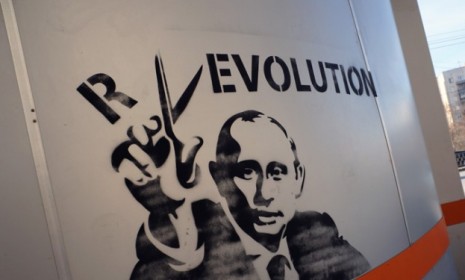The imminent return of President Putin: What will it mean for Russia?
Vladimir Putin's victory in Russia's Sunday election is considered a foregone conclusion. But can he survive what comes next?

A free daily email with the biggest news stories of the day – and the best features from TheWeek.com
You are now subscribed
Your newsletter sign-up was successful
Russian Prime Minister Vladimir Putin is widely expected to win his country's presidential election on Sunday, reclaiming the job he held for eight years before term limits forced him to step aside — at which point he became P.M. Despite massive anti-corruption protests, polls show that Putin still has the backing of 60 percent of his constituents, suggesting that he could win a majority in the first round and avoid a run-off. What can we expect from another Putin term? Here, four predictions:
1. The protests will grow
This election's outcome isn't in doubt because it's all been "choreographed" for years, say David J. Kramer and Christopher Walker at Foreign Policy. Still, unrest is growing. Putin's most serious liberal challenger, Grigory Yavlinsky, was disqualified from the race in January in a politically motivated scheme, and Putin's United Russia party was charged with vote-rigging in December's parliamentary elections. The result? Putin has been increasingly vilified in public — once unthinkable. And since Putin has yet to offer any real promise of the reforms the Russian people seek, the protests he's faced so far are nothing compared to what's to come when he assumes the presidency.
The Week
Escape your echo chamber. Get the facts behind the news, plus analysis from multiple perspectives.

Sign up for The Week's Free Newsletters
From our morning news briefing to a weekly Good News Newsletter, get the best of The Week delivered directly to your inbox.
From our morning news briefing to a weekly Good News Newsletter, get the best of The Week delivered directly to your inbox.
2. And Russia could face an outright revolt
Putin's "KGB officer instincts" will likely motivate him to tighten his grip on Russia, says Ariel Cohen in The Christian Science Monitor. That would be a grave mistake. Russia's problems — economic and political — have grown so urgent that Putin can no longer distract critics with repression and pride-boosting tweaking of the U.S. over Iran and Syria. If Putin fails to focus on crafting real reform and making Russia more attractive to foreign investment, the country faces stagnation unseen since the Soviet era. At worst, "it could blow up in a bloody revolt."
3. Putin will try hard to placate protesters
The "mink coat revolutionaries" in Moscow aren't Putin's biggest problem, says Neil Buckley at Financial Times. He'll probably satisfy them by allowing "limited political liberalization designed to take the heat out of the urban protests." The bigger challenge will be keeping poorer, provincial Russians happy, which Putin will attempt through "populist spending increases," such as boosting pensions and teachers' pay. If that fails, and Putin's rural base joins the reform-minded urban middle class, Putin may face a "perfect storm" of protest.
A free daily email with the biggest news stories of the day – and the best features from TheWeek.com
4. Whatever happens, this is the beginning of the end for Putin
Twelve years ago, Putin took power after the uncertain era following the Soviet Union's collapse, and "many Russians were grateful for the stability and prosperity he brought with him," says The Economist. But times have changed, and Putin has outlived his usefulness. What happens next is up to Putin: "He can respond to the pressure for change by trying to repress it," magnifying opposition to his rule. Or he can accept the inevitable and serve just one six-year term. Either way, "the beginning of the end of [Putin's] reign has begun."